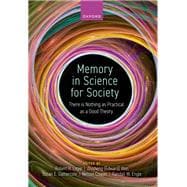Memory is essential for every day life. The understanding and study of memory has continued to grow over the years, thanks to well controlled laboratory studies and theory development. However, major challenges arise when attempting to apply theories of memory function to practical problems in society. A theory might be robust in explaining experimental data but fail to capture all that is important when taken out of the lab.
The good news is that the application of memory in science to challenges in society is rapidly expanding, and Memory in Science for Society bridges that gap. Inspired by the synergy between theory and application in memory research, leading international researchers share their passion for combining memory in science with applications of that science to a wide range of challenges in society. Chapters demonstrate how that scientific passion has addressed challenges in education, life attainment, second language learning, remembering life events and faces of strangers, future planning and decision making, lifespan cognitive development and age-related cognitive decline, following instructions, and assessment and rehabilitation of cognitive impairment following brain damage.
Written and edited by the leading researchers in the field, the book will be an important and influential addition to the memory literature, providing a new and comprehensive focus on the connection between theory and practice in memory and society.








